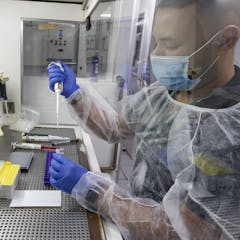
Articles sur COVID-19
Affichage de 401 à 420 de 7936 articles

Reports from China indicate BF.7 is quicker to transmit and has greater capacity to escape prior immunity than other omicron subvariants. But we shouldn’t be alarmed at this stage.

We’re in a better position compared with 2020 and 2021, but the pandemic isn’t over yet.

The new COVID management plan relies on each of us assessing our own risk of COVID.

New Zealand’s MIQ system has been found ‘unreasonable’ yet still broadly justified. And just like the decisions that drove the COVID response, any apology will be more about politics than the law.

Medicare rebated psychology sessions are going back down to ten, following their pandemic boost to 20. But we know ten isn’t enough for most mental health disorders.

Strict lockdowns, quarantines and testing have prevented many people in China from catching COVID-19. With concerns over Chinese vaccine efficacy and uptake, China may be facing a looming COVID-19 surge.

There were deaths from COVID and deaths with COVID – but other deaths are also likely linked to the virus’s impact on our health and our medical care.

Some results of independent testing of rapid antigen tests available in Australia have been made public. Here’s what the data tell us.

Systemic social issues affect vaccine access and acceptability. Yet, the term ‘vaccine hesitancy’ overlooks this, reducing the multiple factors that affect vaccine uptake to individual-level choices.

What’s a polycrisis? We’re in one, and greed and power are undoubtedly worsening it, but our knowledge remains poor. Experts know a lot about individual risks and crises, but not how they interact.

Your COVID infection may not seem any more severe the second or third time around. But it looks like your risks of other health problems increase with each infection.

There seems to be increased complacency around continued COVID infections, and even an attitude that they don’t matter. But they do – and we can reduce the risk.

We’re still learning about long COVID – but working with a physio or occupational therapist on goal-setting could help you get back into your usual routine.

The Chinese population has low immunity against COVID, making it vulnerable to high levels of transmission.

The good news is memory function may improve again over time.

Classic books like Jane Eyre took on new meanings while the lengths of others made us aware of our mortality.

In open-source endowed research positions, professors release all of their intellectual property. Surveys of academics in the U.S. and Canada find most like the idea.

This drug could essentially close the door to the virus, preventing it from getting into our cells.

The Medicines Patent Pool was created to promote public health, facilitating generic licensing for patented drugs that treat diseases predominantly affecting low- and middle-income countries.

Nurses who identify as Democrats have a significantly higher likelihood of having their children vaccinated against COVID-19 than those who identify as Republicans.
